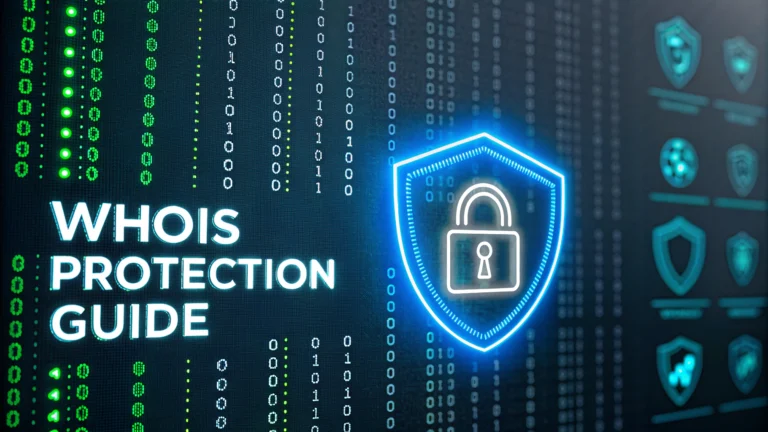WHOIS protection shields your personal contact information when registering a domain name from public visibility.
Domain registrars offer privacy services that replace your personal details with generic contact information in public WHOIS records.
When you register a domain without protection, anyone can view your name, address, phone number, and email through public WHOIS databases.
Why WHOIS Protection Matters
Privacy services prevent potential cyber threats like identity theft, spam, and targeted marketing attempts.
Cybercriminals often scrape WHOIS databases to collect personal information for malicious purposes like phishing or social engineering attacks.
Small business owners and individuals can significantly reduce their digital exposure by using WHOIS privacy services.
Key Benefits of WHOIS Protection
- Personal Information Concealment
- Reduced Spam and Solicitations
- Protection Against Identity Theft
- Enhanced Online Privacy
Most domain registrars offer WHOIS protection as an affordable add-on service during domain registration.
Typical costs range from $3-$10 per year, making it a cost-effective privacy solution.
How WHOIS Protection Works
Privacy services replace your personal contact information with anonymized registrar contact details in public records.
Legitimate communications can still be forwarded to your actual email address through the registrar’s privacy service.
Domain ownership remains legally unchanged, preserving your rights and control over the domain.
Considerations Before Choosing WHOIS Protection
Some professional services like law firms or official organizations might prefer transparent WHOIS information.
Verify that WHOIS protection doesn’t conflict with your specific business or legal requirements.
Check your registrar’s specific privacy policy and forwarding mechanisms before purchasing protection.
Recommended Domain Registrars with Strong Privacy Options
| Registrar | WHOIS Protection Cost | Privacy Features |
|---|---|---|
| Namecheap | Free | Comprehensive Privacy |
| GoDaddy | $7-$10/year | Advanced Forwarding |
| Google Domains | Free | Robust Privacy Protection |
Limitations of WHOIS Protection
ICANN regulations might require accurate domain registration information for legal compliance.
Some domain extensions have specific rules regarding privacy services.
Enterprise and government domains typically require transparent registration details.
Final Recommendations
Always review your registrar’s specific privacy policies and protection mechanisms.
Consider your personal or business privacy needs when selecting WHOIS protection services.
Regularly audit and update your domain registration information to maintain accuracy and security.
Legal and Compliance Aspects of WHOIS Protection
International domain registration regulations create a complex landscape for WHOIS privacy services. The Internet Corporation for Assigned Names and Numbers (ICANN) maintains specific guidelines that domain registrars must follow when implementing privacy protections.
Different jurisdictions have varying legal requirements for domain registration transparency. Some countries mandate more stringent verification processes, while others provide more flexible privacy options. Businesses and individuals must understand these regional variations to ensure full compliance.
Legal challenges can arise when WHOIS protection interferes with legitimate investigations or intellectual property disputes. Courts and law enforcement agencies may require registrars to disclose actual domain ownership information through proper legal channels.
Cybersecurity regulations increasingly recognize the importance of balanced privacy protections. Regulatory frameworks are evolving to provide robust privacy mechanisms while maintaining accountability for online activities.
Advanced Privacy Technologies in Domain Registration
Emerging technologies are revolutionizing WHOIS protection mechanisms. Blockchain and decentralized identity systems offer promising alternatives to traditional privacy services, enabling more secure and transparent domain ownership verification.
Machine learning algorithms now help detect potential misuse of privacy services, providing an additional layer of security against fraudulent domain registrations. These technologies can identify suspicious patterns while maintaining individual privacy.
Encryption technologies are becoming increasingly sophisticated in protecting domain registration data. Advanced cryptographic methods allow for selective information disclosure without compromising personal details.
International WHOIS Protection Strategies
Global domain registration requires nuanced approaches to privacy protection. Different regions have unique regulatory environments that impact how WHOIS privacy can be implemented.
European Union’s GDPR regulations have significantly influenced global domain privacy standards, mandating more stringent personal data protection mechanisms. Many international registrars have adapted their services to comply with these comprehensive privacy requirements.
Multinational organizations must develop comprehensive domain registration strategies that account for diverse international privacy regulations. This often involves creating flexible approaches that can be tailored to specific regional requirements.
Future of Domain Privacy
The domain privacy landscape continues to evolve rapidly with technological and regulatory changes. Artificial intelligence and advanced verification technologies are expected to play increasingly significant roles in protecting domain registration information.
Emerging trends suggest a move towards more granular privacy controls, allowing domain owners to specify exactly what information is publicly visible. This will provide unprecedented levels of customization in online identity protection.
Cybersecurity experts predict continued innovation in privacy protection technologies, with a focus on balancing transparency, security, and individual privacy rights.
Conclusion
WHOIS protection represents a critical component of modern digital identity management. As online threats become more sophisticated, proactive privacy measures become increasingly essential for individuals and organizations alike.
Selecting the right WHOIS protection strategy requires careful consideration of personal or business needs, legal requirements, and technological capabilities. Ongoing education and awareness remain key to effective online privacy management.

